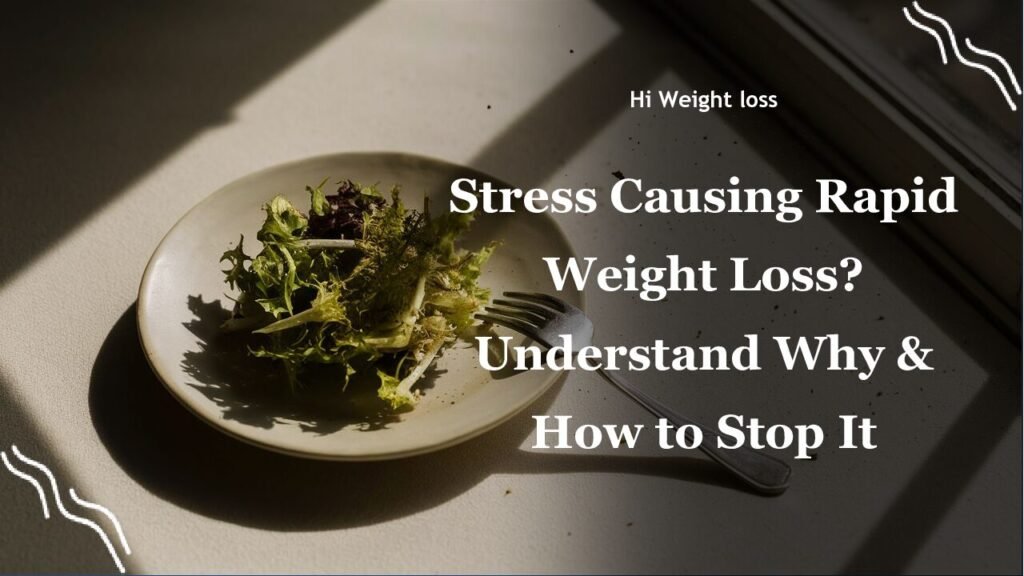Have you noticed a sudden, unexplained drop in your weight? It’s unsettling, right? You might be surprised to learn that stress can actually be a significant factor in unintentional weight loss. This article will delve into how stress affects your body, leading to rapid weight loss, and we’ll explore actionable advice to regain control. Get ready to understand the science behind this phenomenon and discover pathways to better health.
Can Stress Cause Rapid Weight Loss?
The simple answer is yes, stress can absolutely cause rapid weight loss. It’s more than just a feeling; it’s a complex physiological response that impacts your body in several ways. I once experienced a period of intense work stress, and I was shocked at how quickly my clothes started feeling loose. This prompted me to delve into the science behind stress and weight loss, which I’m eager to share with you.
The Science Behind Stress and Weight Loss
When you’re stressed, your body releases hormones like cortisol and adrenaline. These are meant to help you in a “fight or flight” situation, but chronic stress keeps these hormones elevated, impacting your body. Let’s take a look at a few ways this can lead to weight loss.
Loss of Appetite
Stress can significantly decrease your appetite. Have you ever felt like your stomach was in knots and the idea of food was unappealing? This is a common effect of stress. When you’re anxious or overwhelmed, your body can shut down the desire for food, leading to you eating less and consuming fewer calories, which inevitably leads to weight loss. Anxiety can contribute to this loss of appetite.
Increased Metabolism
The increased release of stress hormones can also ramp up your metabolism. Essentially, your body starts burning calories at a faster rate, even when you’re resting. This can create a significant energy deficit, further contributing to unintentional weight loss. Some articles note that stress can affect your weight by altering your metabolism.
Digestive Issues
Stress can wreak havoc on your digestive system. I remember a friend who would experience stomach cramps and nausea before big presentations. Stress can disrupt normal digestive processes, leading to nausea, stomach cramps, and even diarrhea. These digestive issues can make it difficult to eat and absorb nutrients properly, which can lead to rapid weight loss. Stress has a significant impact on the digestive system.
Hyperstimulation and the “Fight or Flight” Response
When you’re under stress, your body activates the “fight or flight” response. This response, meant to protect you from immediate danger, can slow down digestion and suppress other non-essential functions. This redirection of resources can lead to gastrointestinal discomfort and may contribute to weight loss, as the body focuses on survival rather than normal processes.
Behavioral Changes
Stress can also lead to changes in your eating habits. Sometimes you may skip meals because you’re too busy or stressed to eat. On the other hand, you might turn to comfort foods that are high in calories and sugar to cope with stress. These unhealthy coping mechanisms, whether skipping meals or overeating, can contribute to weight loss or weight gain.

How Does Stress Affect Metabolism and Weight?
Let’s dive deeper into how stress impacts your metabolism and, ultimately, your weight. Your metabolism is the process by which your body converts what you eat and drink into energy. Stress hormones like cortisol and adrenaline play a crucial role in this process. However, when these hormones are chronically elevated, they can throw your metabolism out of whack.
As we mentioned earlier, elevated stress hormones can speed up your metabolism, causing you to burn more calories even when you’re at rest. While this might sound like a good thing, the increased caloric expenditure, when coupled with decreased appetite and digestive issues, can quickly lead to rapid weight loss that’s unhealthy.
Stress-Related Rapid Weight Loss Symptoms
Recognizing the signs of stress-related weight loss is crucial. Here are some symptoms to be aware of:
- Sudden and noticeable weight loss, often without trying.
- Loss of appetite or decreased interest in food.
- Frequent digestive problems like nausea, diarrhea, or stomach cramps.
- Feeling constantly anxious, worried, or overwhelmed.
- Difficulty sleeping or feeling restless.
- Increased fatigue or lack of energy.
If you’re experiencing several of these symptoms, it’s a good idea to consult a healthcare professional. You should always discuss these symptoms with a professional to ensure you’re not suffering from an undiagnosed medical condition.
How to Manage Stress and Prevent Unintentional Weight Loss
Now, let’s discuss what you can do about stress-induced weight loss. It’s not just about eating more, it’s about addressing the root cause: stress. Here are some actionable steps you can take:
Identify Your Stressors
Take some time to identify the sources of stress in your life. Is it work, relationships, finances, or something else? Understanding your stressors is the first step in managing them. You can use a journal to track your feelings and recognize patterns.
Practice Relaxation Techniques
Incorporate relaxation techniques into your daily routine. This might include deep breathing exercises, meditation, or yoga. These practices can help calm your mind and reduce stress hormones. There are a ton of free resources online to help you get started.
Engage in Regular Physical Activity
Regular exercise is a great stress reliever. Even a brisk walk for 30 minutes each day can help reduce stress levels and improve your overall mood. It also helps in regulating your metabolism and appetite, promoting healthy eating patterns.
Prioritize Sleep
Lack of sleep can actually worsen stress levels. Make sure to get at least 7-8 hours of quality sleep each night. A regular sleep routine will help your body better manage stress.
Seek Professional Help
If you’re struggling to manage stress on your own, don’t hesitate to seek professional help. A therapist or counselor can provide you with strategies and tools to cope with stress effectively. There is no shame in reaching out for help when you need it.
Eating Tips to Counteract Weight Loss
If stress has caused you to lose weight, you need to focus on nourishing your body with the right foods. Here are some tips:
- Eat regularly: Try to eat small, frequent meals throughout the day.
- Include nutrient-rich foods: Focus on getting enough proteins, healthy fats, and complex carbohydrates.
- Stay hydrated: Drink plenty of water throughout the day.
- Avoid processed and sugary foods: These can cause energy spikes and crashes, which do not help manage stress.
- Consider supplements: Talk to a doctor or dietitian about supplements that may help.
Sometimes it helps to create a food journal to track your meals and how they make you feel. This will help you fine-tune your meal plan.
The Interplay of Stress and Weight: A Summary
Let’s summarize the key points we’ve covered regarding stress and its impact on weight:
| Factor | Impact on Weight |
|---|---|
| Loss of Appetite | Decreased food intake leading to weight loss |
| Increased Metabolism | Higher calorie burn leading to weight loss |
| Digestive Issues | Poor nutrient absorption contributing to weight loss |
| Behavioral Changes | Skipping meals or unhealthy eating habits contributing to weight loss |
Conclusion
Stress can indeed cause rapid weight loss through a complex interaction of decreased appetite, increased metabolism, digestive issues, and unhealthy eating behaviors. Understanding this connection is the first step to regaining control. Just like my own personal experience during a stressful time, it’s easy to ignore what’s happening until the effects become obvious. By identifying your stressors, practicing relaxation, engaging in regular physical activity, prioritizing sleep, seeking professional help when necessary, and focusing on a balanced diet, you can regain control and reverse weight loss caused by stress. It’s a journey towards a healthier, more balanced you, and every step counts. Don’t just read this, use it as a launching pad for change!
FAQ
Can stress cause you to lose weight quickly?
Yes, stress can cause rapid weight loss. The body’s response to stress can lead to appetite suppression, increased metabolism, and digestive problems, all contributing to quick weight loss.
What are the symptoms of stress-related weight loss?
Common symptoms include sudden and noticeable weight loss, decreased appetite, frequent digestive problems, and feeling constantly anxious or overwhelmed.
How can I stop stress from causing weight loss?
Managing stress through relaxation techniques, regular exercise, prioritizing sleep, and seeking professional help, combined with a balanced diet, can help prevent stress-induced weight loss.
Are there certain foods that help with stress related weight loss?
Yes, focus on nutrient-rich foods like proteins, healthy fats, and complex carbohydrates, which provide sustained energy and support overall health. Try to eat regular, small meals and drink plenty of water.
When should I seek medical help for stress-related weight loss?
You should seek medical help if you experience rapid, unexplained weight loss, along with other symptoms like severe anxiety or persistent digestive issues. A healthcare professional can help identify and manage underlying medical conditions and provide support.



